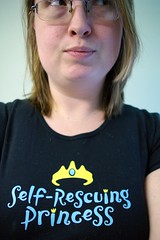“… as a matter of fact, I’ve got it now”. (VB ad reference – nothing to see here, move right along)
When I was younger, I rarely got period pain, and that was nice, and if I did it was relatively mild and lasted maybe half the day and was more discomfort than something I’d worry about. But even then whenever I changed from one contraceptive medication to another, even within the same family (where family in this case means named brand and the generics for that brand), I’d have a higher level of discomfort for the first period of that newer medication than the others. But generally it’d be half a day of, “I’m not comfortable, I have some discomfort, I’m managing”.
Then I had an ectopic pregnancy, and I’m guessing the scarring from that makes such things far more complicated than they once were. I should not be at work today, but my stubbornness, and access to high strength painkillers (which I hoped would make a difference) meant I wandered in anyway. I changed contraceptive medication again and today I’m in agony. Well not complete agony, I know women who have FAR worse period pain than I’m in right now, but today is really bad for me, almost as bad as the post-partum bleeding from the miscarriage I had 10 months after the ectopic pregnancy, which had me consulting friends, health care professionals and alternate medicine for things to relieve pain (because waiting for it to go away was not an option I wanted to consider).
This is when I don’t like being a woman. I don’t like the roiling, spasming discomfort that sometimes turns into sharp pointed stabs. I don’t like having to rely on painkillers to survive the day. I don’t like having to have a day of pain just because I changed medication (even from generic A, brand X, to generic B, brand X). I don’t like the fact that I can’t predict how much pain I’m going to be in, and that even Ibuprofen with codeine doesn’t seem to have a sufficiently far reach. I don’t like the fact that I’m at work when I should be at home, in bed with a book and hot water bottle, waiting for the pain to go away where I don’t have to think, or act normal (where in this case normal is the world where I’m not in pain and discomfort).
This is where I can point at “Intelligent Design” and say, “No, I was not intelligently designed, because if I was, this should not be a problem”.
UPDATE:
Ok, I’ve thought about this a bit longer, in between bits of work, an extended lunchbreak and an incredibly indulgent hair cut (thanks Scoopon). I remembered Chally’s post about “Taking a Sickie” and how problematic that can be for disabled people and how generally being seen to “bludge” every now and again is ok for abled bodied Australians, but not for disabled Australians. And then I thought about how some managers I have had, have framed sick leave and what is allowable sick leave and what is seen as problematic sick leave.
Clearly, if you have an infectious disease (the ‘flu, a cold, etc) you’re expected to take the first few days off while you are infectious and then, to use Codril’s advertising campaign phrase, “Soldier On”. If you have an injury, sufficiently serious of course, then taking the time off to heal as per your treating medical practitioner is also ok. If you’re recovering from surgery, then the time recommended by your treating medical practitioner is also ok to take off, and more if there were complications or you’ve still not recovered.
However, there are conditions that aren’t judged to be as serious, or that because they require repeat days of leave from work (ie, once a month), that managers I’ve had suggest that the individual is bludging and isn’t really sick. This has happened for women suffering bad, and repeated, period pain and for women suffering repeating migraines. Both conditions which can temporarily incapacitate someone for a few days.
In these instances the unfair burden falls on women to justify that their pain is sufficiently serious enough to take time of work, and trying to explain pain to someone who doesn’t experience it, is a hard thing to do. Yes, I want to scoop out my entire hip region to remove the pain, really doesn’t cut it with someone who doesn’t experience period pain, especially if I was taking two or three days (fortunately for me not) days off work a month. I’ve been told that male managers won’t ask for more detail after they hear the word “period”, which has been true for me, but if I regularly took time off, I can imagine that the conversation would happen eventually.
I remember reading somewhere (though not sure where now, and also not sure how accurate it is) that women have more health issues than men because we’re slightly more complex organisms (the whole XX thing makes us chimeras for starters). Though I also think that men probably under-report their health issues, with the whole “Aussie Battler” thing going on.
So yes, chronic pain conditions are not treated fairly in the workplace – which won’t come as any great surprise to people who have chronic pain issues.

